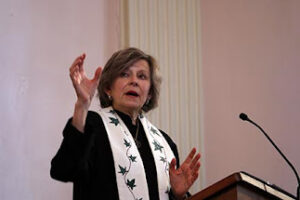 What is Worship?
What is Worship?
Worship is an opportunity for the gathered community to experience the Holy. So, what then, is “the Holy” for Unitarian Universalists? In our book, “Worship that Works”, I wrote about my understanding of the holy in this way: “…the universe in which humanity dwells remains fundamentally mysterious to us, despite many advances we have made towards understanding it. The apprehension of the holy is an experience that exists both in time and out of time, an experience where body and mind drop away and we have a sense of beauty, awe and oneness with the world around us.”
Through the liturgical arts of word, music, ritual and silence, we invite each member of the worshiping community to hold up those things of value and worth that they feel within and that the experience beyond themselves. Worship gives us a link to our past and a gateway to our future. Worship honors the mystery of life and recognizes that which is invisible and essential to our lives can be made visible and manifest.
In crafting worship, I begin with the belief that people come to worship because they wish to have their lives transformed for the better – and there is no one formula for that transformation. Sometimes lives are changed by a stirring sermon or a powerful reading; other times it may be the well-placed flower arrangement or a piece of music that brings unrestrained joy or a torrent of tears. It may be a profound sense of being connected to something greater than oneself, even through something as simple as breathing together in community. Worship is an art form and it is a spiritual practice that can and does change lives. It is to be handled with the utmost skill and care.
Worship is a joint venture between a people and their minister. Since early in my ministry, I’ve worked closely with lay leader teams (often called worship associates) who help to craft worship and who bring the voice of the laity into the worship service. It’s a powerful and important role and one that benefits all. The crafting of worship together requires patience, practice and participation. It asks the minister to respect the traditions that have been developed by a congregation over time, while encouraging innovation. Liturgy is shaped and changed by the relationship between a minister and a congregation.
Music is integral to the crafting of excellent worship. Music serves as both a bridge between the sections of the service, and a focal point to expand our awareness, to challenge us through its unique constellations of word, tone, key and rhythm. Unitarian Universalist churches now ask more of our musicians than ever, wanting our music programs to reflect the diversity found in our own members’ CD and mp3 music collections. With skill and attention, almost any musical genre can work well in a church setting.
When all the components of a service; the music, the liturgy, the sermon, the setting and the gathered community come together to explore life’s deepest and most challenging questions,worship has the power to transform our lives.
About Religious Language. I’ll often get asked about how I use religious language, so I thought I might offer you some insight into my thinking here. How a minister uses language, especially from the pulpit, is important. How a congregation hears that language is also important. I am aware that many come to our congregations with concerns about hearing traditional words, usually, but not exclusively, found in Christian contexts (God, holy, salvation, sin, resurrection, etc.) Traditional religious words themselves are not the problem; its how they have been used, abused, interpreted and misinterpreted that is the problem! It is my hope that in whatever setting I am hired to serve, freedom of the pulpit naturally extends to exploring religious ideas using religious language. My sermons, found on the next drop down of this website, give you a good idea of how I use religious language in sermons and services.
 What is Worship?
What is Worship?